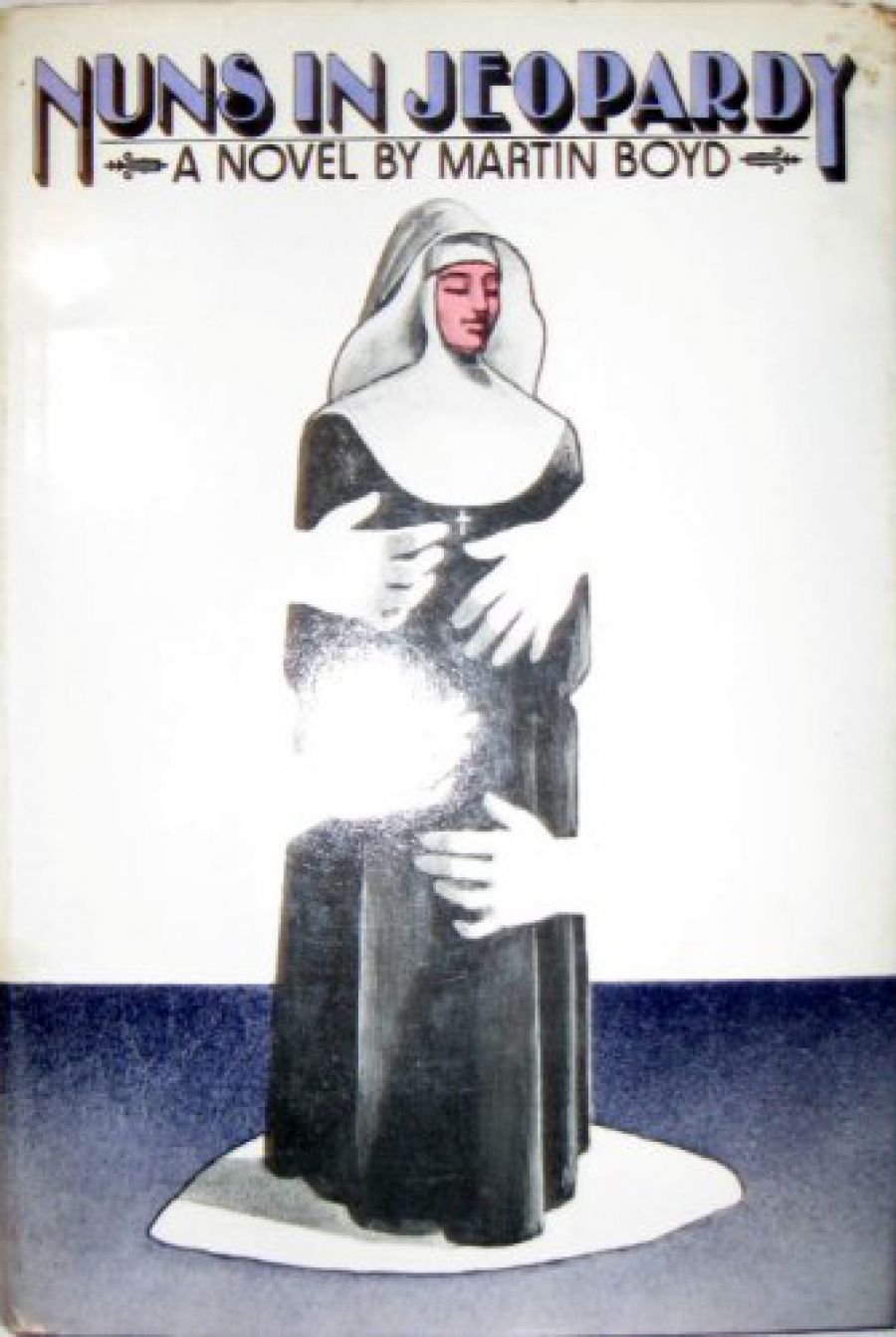
- Free Article: No
- Contents Category: Fiction
- Review Article: Yes
- Custom Highlight Text:
It is astonishing how many major works of Australian fiction – and often major works in themselves – are out of print at any given time. Angus and Robertson and Penguin, occasionally assisted by smaller firms like the specialist feminist press Virago and the university presses, have done fine work in drawing attention to novels and writers undeservedly out of print. One writer who seemed out of fashion for a time but whom Penguin are systematically bringing back into print is Martin Boyd. The latest is their series of reissues of his work is a relatively little known and lightweight novel with the misleadingly enticing title of Nuns in Jeopardy (first published in 1940).
- Book 1 Title: Nuns in Jeopardy
- Book 1 Biblio: Penguin, $6.95 pb, 215 pp
After four or more days on the lifeboat the group finally come upon an abandoned, paradisial island where they stay for some time. Having jettisoned his own excess baggage of characters, Boyd now concentrates on the handful he has elected to save, and especially: Harry, the embodiment of sensual innocence; Sister Agatha, the beautiful forty-year-old nun who, despite her self-questioning and doubts, finally retains her vocation; Dick and the novice Winifred with whom he falls in love, and Joe who sacrifices himself to save Dick.
Much of the book seems to be written in a mode that approximates realism and Boyd’s characteristically elegant, ironic wit is much in evidence. Horrific events – the eating of the capsized passengers by sharks, the casual death of Mrs Stevens, the death of Joe who is taken by an alligator – are recounted in a startlingly casual fashion. Yet the underlying tone is one of genuine, if often enigmatic, seriousness. Where the novel is most puzzling is in its comic and elegant presentation of horrific events, such as a character’s sliding off the deck during a storm to her death. The style is peculiarly and rather engagingly devoid of feeling for most of the characters though there are passages of considerable beauty in its natural description. Whereas in another recently reprinted Boyd novel, A Difficult Young Man (1955), Boyd makes heavy use of images drawn from the visual arts, here the most pervasive veins of imagery is of animals and insects, various forms of natural life.
The novel comes closest to allegory in its presentation of Mr Smith who appears out of the water to join the survivors in the boat, guides them to the island, and whose function seems to be to reveal the characters and their desires to themselves – and in some instances to grant them. Like so much of Boyd’s writing, though in a different way from the Langton sequence, the disguised subject of the novel is repression – civilisation and its discontents. On the desert island, away from the restrictions of society (and, of course, in the case of nuns, the even harsher self-imposed ones) all of them change. Dick and the novice Winifred fall instantly in love; there is incipient feeling of a quasi-sexual kind between Joe and Dick also; Sister Agatha has disturbing dreams about Mr Smith, though she is successful in sublimating her feelings; Ursula rejects the possibility of rescue, recognising the truth of Mr Smith’s claim that she has the life she wants there on the island; even the loutish Tom and George unsuccessfully attempt to impose their sexual will upon the nuns.
The argument between Agatha and Mr Smith that closes the novel is a strikingly intimate dramatisation of Boyd’s own ambivalent and divided feelings. Mr Smith tells her:
I love to see everything acting according to its nature. I love the bounding heart and the teeming brain. Bur the bounding heart must come first. You must become all that your natural self is capable of being before you can stop to think about it, otherwise you just shrivel up.
to which the careful and thoughtful nun replies:
It is no use ... to strive after things which are more than your nature can bear, even if they are good in themselves ... I can’t make that direct approach to the universe. 1 should be destroyed. I have to make my approach through the convention of God.
Paradoxically, the form of the semi-parable has allowed Boyd to speak almost more personally than anywhere else in his writings.


Comments powered by CComment